
Raleigh | Durham | Chapel Hill
June 12, 2024

Juneteenth
EVENTS AROUND THE TRIANGLE, P. 12




Raleigh | Durham | Chapel Hill
June 12, 2024

Juneteenth
EVENTS AROUND THE TRIANGLE, P. 12


 BY ANDREA RICHARDS, P. 14
BY ANDREA RICHARDS, P. 14
The new Locals Seafood market and processing facility will anchor statewide distribution routes—and help get seafood to more North Carolinians.
4 Renovations to the Pope House will expand its role in teaching Raleigh's Black history. BY MATTHEW JUNKROSKI
6 A Q&A with Hashem Amireh, president of UNC's graduate student union who was suspended after the pro-Palestine protests. BY LENA GELLER
10 Apex high school students will showcase their art at the town's annual Juneteenth festival. BY MILA MASCENIK
12 A roundup of Juneteenth events across the Triangle. BY MILA MASCENIK
14 "Locals Seafood was—and still is—a wonderful partner in making sure we push the idea this idea of 'North Carolina first' in terms of seafood," Chef Ricky Moore says of the seafood company. BY ANDREA RICHARDS
18 Why have several Raleigh breweries shut their doors for good? BY SAM OVERTON
20 Photo Essay: At the 20th Annual Beaver Queen Pageant, contestant Woody Wonka took home the crown. BY ANGELICA EDWARDS

Publisher John Hurld
Editorial
Editor-in-Chief
Jane Porter
Culture Editor
Sarah Edwards
Staff Writer
Lena Geller
Reporters
Justin Laidlaw
Chase Pellegrini de Paur
3 Op-ed
24 Culture calendar
COVER Ryan Speckman, the Locals Seafood co-owner, points out Wanchese on a map, a focal point in North Carolina’s commercial fishing industry PHOTO BY ANGELICA EDWARDS
Contributors
Mariana Fabian, Desmera Gatewood, Spencer Griffith, Carr Harkrader, Matt Hartman, Tasso Hartzog, Brian Howe, Kyesha Jennings, Hannah Kaufman, Jordan Lawrence, Elim Lee, Glenn McDonald, Nick McGregor, Gabi Mendick,
Copy Editor
Iza Wojciechowska
Interns
Matthew Junkroski
Mila Mascenik
Avery Sloan
Creative
Creative Director
Nicole Pajor Moore
Graphic Designer
Ann Salman
Staff Photographer
Angelica Edwards
Advertising
Publisher
John Hurld
Director of Revenue
Mathias Marchington
Director of Operations Chelsey Koch
Circulation Berry Media Group
Membership/subscriptions
John Hurld
INDY | indyweek.com
P.O. Box 1772
• Durham, N.C. 27702
919-666-7229
support@indyweek.com
to email staff directly: first initial [no space]last name@indyweek.com
Advertising sales sales@indyweek.com 919-666-7229
Contents ©2024 ZM INDY, LLC All rights reserved. Material may not be reproduced without permission.

Exploring the impact of housing on wellbeing
BY RASHEEDA TALIAFERRO MONROE backtalk@indyweek.com
The importance of housing as a social driver of health cannot be overstated, yet the intricate pathways connecting housing conditions to health outcomes remain inadequately understood. This knowledge gap is particularly impactful for low-income families who face unique challenges in establishing a sense of home. My experience as a pediatrician at WakeMed has shown me firsthand how critical stable and quality housing is to the health and well-being of children and their families. Over the years, I have encountered numerous cases where substandard housing has exacerbated health conditions, from respiratory issues due to mold to stress-related ailments stemming from insecure housing. These observations fueled my commitment to developing Beyond Our Walls, WakeMed’s health equity curriculum, which explores how issues like housing are pivotal factors in public health.
Our work has revealed that property quality and even neighborhood location result from historical local and federal policies that segregated and marginalized communities with intention and continue to impact the health and well-being of minoritized communities today significantly. That is why we must address the physical, psychosocial, and historical aspects
of housing in public health interventions. In Wake County, where I practice, one-quarter of residents are housing cost–burdened, meaning they spend more than one-third of household income on housing. Approximately 56,000 working families who make less than $39,000 a year in Wake County are currently unable to find affordable housing.
The Raleigh Area Land Trust (RALT) is working to serve as a solution for needy families by mitigating housing instability and promoting health equity. As a community land trust, RALT ensures place-based, permanent housing affordability. The nonprofit allows the community to retain ownership of the land. At the same time, the resident purchases the home at an affordable rate, providing a stable foundation that fosters health and economic security. As a board member of RALT, I am proud that we can provide an innovative path to homeownership. In addition to affordability, community land trusts prioritize community engagement and stewardship. Through resident-led governance structures, RALT ensures that community members have a voice in decision-making processes related to land use and development. This collaborative approach fosters a sense of ownership and pride among residents, leading to vibrant and
resilient neighborhoods.
Moreover, community land trusts are crucial in preserving housing affordability amid rapidly changing real estate markets. By removing land from the speculative market, RALT prevents gentrification and displacement, preserving the socioeconomic diversity of neighborhoods and promoting inclusive growth. This proactive approach to housing development creates thriving communities where residents of all backgrounds can access safe, stable, and affordable housing options.
As we look to the future, expanding community land trusts holds tremendous potential for addressing systemic inequities in housing and promoting health and well-being for all. By advocating for supportive policies and increasing investment in community-led housing solutions, we can create a more equitable and sustainable housing landscape where everyone has the opportunity to thrive. W
Dr. Rasheeda Taliaferro Monroe is a board-certified pediatrician with WakeMed Physician Practices—Pediatrics. She has a rich background in clinical practice and medical education and is actively involved in addressing social determinants of health through her role with the Raleigh Area Land Trust.

Renovations to the Pope House, the historic home of one the state’s first licensed Black doctors, will expand its important role in teaching Raleigh’s Black history.
BY MATTHEW JUNKROSKI backtalk@indyweek.comOn South Wilmington Street, one of Raleigh’s few bastions of the past stands seemingly frozen in time.
The Pope House’s rustic brick exterior and aging white paint looks nearly identical to when it was first built in 1901. But by August, the Pope House will take another step back in time, featuring restorative renovations that staff hope will give visitors a clearer look into Raleigh’s Black history.
To Hazel Boomer, manager at the Pope House, this small house is far greater than its size.
“I always say that the house is small but mighty because of the ton of history that just exists in this place,” Boomer says.
The Pope House is North Carolina’s only African American house museum. While it’s currently closed for the renovations, during this Juneteenth month its staff continue their work to share the rich Black history of both Raleigh and the family that originally occupied the home.
Margaret Damghani, a museum educator at the Pope House, says the renovations are an opportunity to improve the museum’s programming.
“We’re using the renovation as a way to try to tell this really complicated history but also take advantage of the fact that this house is still here with all this stuff,” Damghani says.
Alongside structural renovations, Boomer says the Pope House staff intend to add some important upgrades, including interpretive signage, additional classroom space, and a garden fully stocked with plants Dr. Manassa Thomas Pope would have used in his medical practice.
“We are expecting to try and find medicinal flowers and herbs, because we actually found his medical remedies,” says Boomer. “We would like to incorporate that and use that to talk about medicine in the 19th and 20th century, because we talk about Dr. Pope, we talk about the family, but we don’t really talk about what it was like being a doctor and being a Black doctor in those times.”
Additionally, Boomer says new classroom space will help the Pope House support more visitors.
“In March, we had two large school groups come by the

Pope House, and … we didn’t fit them all in,” Boomer says. “We broke them up into four groups and we had different programming, and that was very successful. But that will help us host these large school groups and other groups more often due to some of the space that we will have.”
The final change to the Pope House will be the addition of two rooms formerly closed off to visitors: the Pope bedroom and the kitchen. With these new rooms, Boomer says the museum can display more items from its collection.
Dr. Pope built the Pope House in 1901. Pope was not only one of the first licensed Black doctors in North Carolina but one of only seven people of color in Raleigh registered to vote.
It was through his right to vote that Pope ran for mayor in 1919, becoming the first Black man to do so in the South during the Jim Crow era. He didn’t win, but Calvin Lightner, an architect, businessman, and the father of Raleigh’s first Black mayor, Clarence Lightner, who was elected in 1973, later recalled Pope’s historic run.
“We knew we wouldn’t win, and if we did win the whites wouldn’t let us administer, but we did it to wake our people up politically,” Calvin Lightner said.
The Pope House sits on what was the color line of the Third Ward, which segregated the historically Black neighborhood from others around it.
Despite how small the house appears today, it was considered a mansion at the time. Boomer says many similar buildings would have surrounded Pope’s home, ranging from small businesses and churches to hospitals.
“It’s very hard to imagine this area had a lot of people living here, but this house represents what was here,”
Boomer says.
Throughout the 1900s, Pope’s two daughters, Evelyn Pope and Ruth Pope, preserved the family home. In 2000, the house was turned into a museum.
Robyn Herndon, program manager for the City of Raleigh Museum, says the Pope House sets itself apart by showing that people can learn about Black history without referencing plantations.
“It’s so great, really, to tell 100 years of history without really having to reference that,” Herndon says. “There are so many accomplishments of Dr. Pope and the Pope family and the community that it’s just history.”
Boomer also says the Pope House sets itself apart from other museums this way.
“A lot of Black Americans, especially when it comes to media, feel like the only media that kind of represents them when it comes to history is either slavery or the civil rights movement, there’s no in between,” Boomer says.
To Boomer, the Pope House isn’t just a museum but a place to uplift Black visitors and allow them to connect to Black history.
“I think of it as a home,” Boomer says. “Because in the larger sense, African Americans have a harder time finding their ancestry due to enslavement. Because you don’t have that ancestry, it’s very hard to grasp the history. But [the Pope House] represents a physical history, a physical ancestry that I believe all Black Americans can connect to.”
While the Pope House remains closed until August, staff will continue free walking tours of the Third Ward from June 15 to August 18 on Saturdays from 10 a.m. to 3 p.m. and on Sundays from 1 to 3 p.m. W

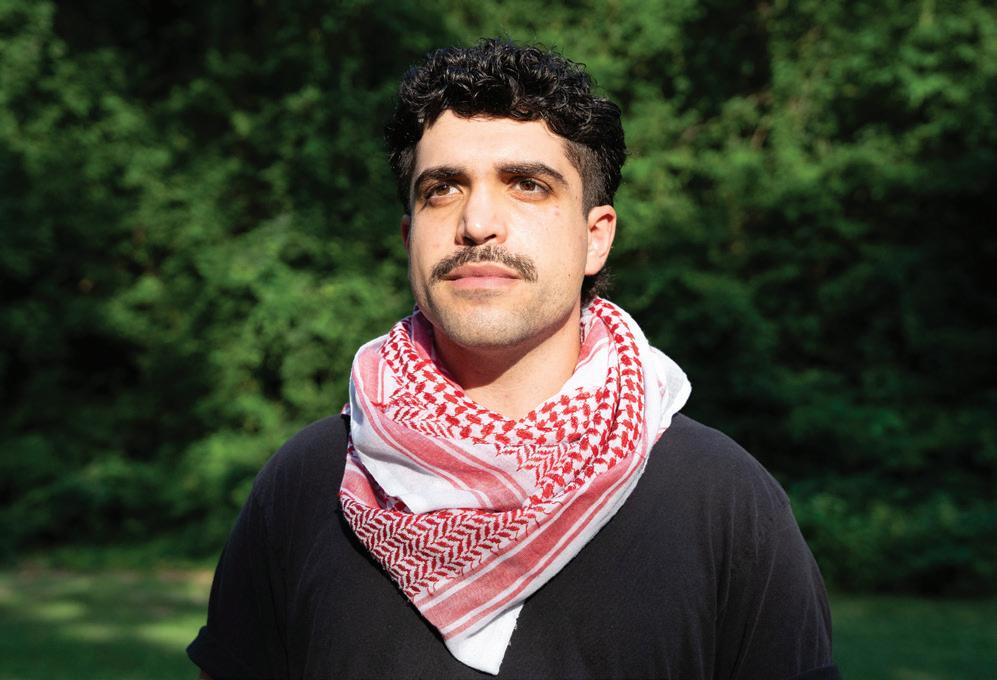
A Q&A with UNC graduate student union president Hashem Amireh, who was suspended following the UNC protests, about the pro-Palestine student movement and recent encampment and police confrontation
BY LENA GELLER lgeller@indyweek.comHashem Amireh was sitting by himself in a conference room when his friends texted him, around 5:30 a.m. on April 30, to say that UNC campus police were coming to dismantle the Palestine Solidarity Encampment on the quad.
Amireh, a doctoral student in economics who serves as president of the UNC-Chapel Hill graduate student union, had spent much of the previous four days at the encampment but wasn’t on-site that morning because he’d walked 20 yards away from his tent to get some work done in Gardner Hall. When campus police began arriving, Amireh hopped in his car and did a quick loop around campus to get a sense of how large the police presence was, he says. By the time he got back at 6 a.m., police were already arresting protesters in the encampment. Amireh accompanied the six protesters who were arrested (three UNC students and three non-students,
according to the university) to the Orange County Courthouse. (Thirty other protesters were detained and cited for trespassing but released on-site.) Then he returned to campus to attend a vigil outside Wilson Library that Faculty for Justice in Palestine organized in the afternoon. Following the vigil, Amireh and hundreds of others marched to South Building for a rally, which escalated when UNC interim chancellor Lee Roberts arrived with dozens of police officers, who forcibly reinstated an American flag that protesters had removed and replaced with a Palestinian flag.
The following week, Amireh received notice that he was banned from campus and suspended from UNC on disciplinary charges related to his participation in the protests. UNC has not publicly announced that it suspended any student protesters, though in early May, hundreds of faculty members signed a petition calling on univer-
sity administrators to drop protest-related disciplinary charges against 15 students.
Amireh says his suspension and campus ban are temporary but indefinite. At an upcoming hearing, university officials will decide whether to revoke or sustain the suspension, he says. For legal reasons, he can’t currently get into the details of what the university is alleging as grounds for his suspension. In an email to the INDY, a UNC spokesperson wrote that “federal privacy laws prevent disclosure about conduct cases.” The INDY independently confirmed that the university suspended Amireh.
Amireh, who is Palestinian Jordanian, has helped head up the pro-Palestine student movement at UNC since November, a month after Israel began to decimate Gaza in the wake of a surprise Hamas attack that killed almost 1,200 Israelis and saw hundreds more taken hostage. In the weeks since commencement, action on UNC’s campus has quieted as students have cleared out for the summer, but the war has dragged on: around 120 hostages remain in Gaza, many of whom are believed to be dead, and Israeli air strikes and ground operations have now killed more than 36,000 Palestinians, including at least 7,797 children.
Ahead of Amireh’s disciplinary hearing at UNC, the INDY spoke with him to learn more about the mechanics of the student movement and to hear his thoughts on administrators’ justifications about the university’s response to the movement and the war.
INDY : The pro-Palestine student movement at UNC is rooted in part in a call for the university to disclose its investments with Israel and divest from them. Why?
AMIREH: In the United States, we still have universities, companies, and all sorts of other organizations doing business with the Israeli government. When a university does not divest from Israel, it contributes to the continuation of Israel’s oppression of Palestinians and the atrocities being committed in Gaza. A lot of our organizing has been inspired by the student anti-apartheid movement to divest from South Africa in the 1980s. [Editor’s note: The INDY contacted UNC for comment regarding students’ demand for divestment but a university spokesperson did not address that issue.]
What has the student movement at UNC looked like over the past seven months? And which student groups have been involved?
We’ve had a lot of conversations about how we should approach the call for divestment. There’s been a question of “How do we bring attention to the issue so that the university will listen to us, and not just create noise and go by the wayside?” There was a feeling that if we wanted to make our voices heard, we needed to be more, I think, audacious with our moves. In November, there was a sitin in an administrative building that marked an escalation for student movement tactics. Then there were several rallies and teach-ins and banner drops, and then we set
up the encampment in April.
UNC, Duke, and NC State chapters of Students for Justice in Palestine (SJP) have been involved, as well as Graduate and Professional Students for the Liberation of Palestine and Jewish Voice for Peace.
Why did you set up the encampment?
We want to be something that you can’t ignore. This isn’t just about divestment; it’s about bringing attention to a genocide. The encampment also has symbolism to it as well, which is that hundreds of thousands, if not millions, of Palestinians in Gaza are currently living in tents.
On April 30, police came to dismantle the encampment after it was up for four days. What were you doing at the encampment before it was taken down?
There were a lot of teach-ins about Palestine, movie screenings, people who were just chilling and talking, people doing work, religious services including Muslim and Jewish services.
The university said we were disrupting university operations by having tents on the quad, which is ironic, because once they took down the encampment, they put up barricades, so now no one has been able to use that space. [Editor’s note: UNC took down the fencing around Polk Place on June 2, a month after it was erected and several days after the INDY interviewed Amireh.] At least with the encampment, there were people using the space—I mean,

really using the space. And other students were still able to go about their day and get to class.
But in some ways, the goal of the encampment was to disrupt, right? To be something that people can’t ignore?
It’s a balancing act. It’s tough, because you want to be present, you want to be in people’s face about it, but you also don’t want to turn people off. But sometimes, the severity of the crimes means that we have to lean into the disruptive aspect of things. People are able to just go about their day and not really pay attention, and sometimes you have to keep escalating until people start paying attention. Before we had the encampment, how much news coverage did the protests get at UNC? Almost none.
But again, it wasn’t something that was hindering people from living their lives. In fact, during the flag incident, like in the heat of it, I saw three girls who were completely uninvolved with the protests, they came over with food they’d gotten from Raising Cane’s and set up shop on the same bit of quad where the flag incident was happening.
Several hours after the encampment was dismantled, protesters removed the American flag from the Polk Place flagpole and replaced it with a Palestinian flag. Why did protesters do that?
I personally was not involved in that. But removing the American flag and putting up a Palestinian flag is a valid form of protest. The week before that incident took

place, the United States had passed a bill to give the Israeli military, which is currently engaging in genocide, $17 billion. Therefore, the removal of the U.S. flag is in itself a valid form of protest, and putting up the Palestinian flag is a symbol of solidarity for the Palestinians and the Palestinian cause.
The “safety update” that UNC posted on its website about the events of April 30 cites “throwing full water bottles at University leaders and others,” “leaving a voluminous stream of trash and belongings that required a major clean-up operation,” and “intimidating fellow students or other passersby who were not engaged in the protest” as activities that student protesters engaged in that were not peaceful, as well as removing the flag.
No one was being intimidated just because they were passing by. We consistently collected our own trash and actually transported it and threw it out somewhere else because we didn’t want to overflow the trash bins that were close to the encampment. When the police came—and we’ve seen this at other universities, too—they tore through the encampment and made it look awful, and then the university sent out a photo to try to make it look like we’d dirtied up the quad.
I didn’t throw any water bottles, so I can’t really comment on what was going on in people’s heads. If I had to guess, it came from a place of anger. The police started the violence. They were brutalizing students around the flagpole. Students were being pushed and maced. A student in a wheelchair was pushed down with a barricade thrown on top of her.
[Editor’s note: The INDY contacted UNC for comment regarding the photo of the encampment that university officials disseminated on April 30, but a university spokesperson did not address that issue. Regarding allegations of police brutality, the spokesperson wrote that “UNC Police will investigate all allegations and complaints of misconduct against any member of the Department.” ]
The News & Observer published a photo that depicts you in an altercation with a counter-protester. Can you provide any context around that photo?
He attacked a student, as you can see in the photos that INDY Week posted. I was intervening to ensure the student’s safety.
You and other student protesters were suspended in the wake of the events of April 30. What can you tell us about the suspensions?
I have not been charged with any criminal offenses. The allegations outlined in my suspension are simply false. It is my opinion that UNC is using false allegations against me in order to silence me as a prominent Palestinian voice advocating for Palestinian liberation on campus. I cannot comment on the specific allegations at this time.
movement is irresponsible. It’s important to acknowledge that there was a large Jewish contingency that was part of the encampment. The president of SJP at UNC is Jewish. So there is this attempt to try to villainize the movement as antisemitic, and it’s honestly quite dangerous to associate us with antisemitic actions that had nothing to do with our movement. When Lee Roberts came in with all of the police officers to put the American flag back up, there was a UNC Hospitals Police Department officer, and there’s a video of him where he spits on the Pales-
“Fighting for liberation is a universal value, whether it’s liberation of workers, or the liberation of Palestinians, or liberation of Black people in America. All of these issues are interrelated in the United States.”
In an interview with Chapelboro last month, Interim UNC Chancellor Roberts said there’s been a rise in antisemitism on campus, citing “an arson threat against a Jewish fraternity building;” “the slogan that is written at the gates of Auschwitz, written on a whiteboard,” and “swastikas and antisemitic slurs written on Jewish students’ dorm room doors.” Roberts said, “I know some people have tried to deny that there’s any connection between these very active pro-Palestinian protests and the clear rise in antisemitism. I think that’s a stretch. It seems clear, at least to me, that there is a connection.”
It is the university’s responsibility to publicly acknowledge hate speech and threats. That shouldn’t be swept under the rug. But making the conflation that these incidents are results of the pro-Palestine student
“there’s clearly no consensus that Israel has to be punished and that companies should divest.” What do you think of the distinction Roberts drew?
If you look at the Daily Tar Heel archives, College Republicans and a group called Students for America were both very much against the anti-apartheid movement and were trying to bring it down. In 1986, when the student anti-apartheid movement built shantytowns in the quad—similarly to our encampment, to bring attention to the issue—they were taken down and five students were arrested. But before that happened, these groups going against the anti-apartheid movement had their own set of counterprotests. They built a Berlin Wall in opposition to the shantytowns. So there very much was a controversy around that movement, and there was resistance from the university. It took years to get UNC to divest [from South African companies] back then.
You’re the president of UNC’s grad student union. How does the pro-Palestine student movement align with the grad student union’s cause?
tinian flag. And yet we don’t see administrators making a public statement about that, even though there’s a clear connection between that action and anti-Palestinian discrimination. So there’s a double standard of what discrimination the university speaks out against and what it’s willing to let pass.
You mentioned that the pro-Palestine movement at UNC is inspired in part by the movement against South Africa’s apartheid regime. In the Chapelboro interview, Interim Chancellor Roberts said he attended college “in the late 1980s, [at] the height of the anti-apartheid divestment movement” and that at that time, “there was a broad consensus, of course, that apartheid was wrong, and [efforts] to bring about the end of apartheid were justified.” He said that the difference between that movement and this one is that
Fighting for liberation is a universal value, whether it’s the liberation of workers, or the liberation of Palestinians, or liberation of Black people in America. All of these issues are interrelated. In the United States, we have rising inequality, and the status quo is unsustainable and harmful. We have allowed forces within this country to separate us by trying to vilify different groups in order to prevent us from working against the system that really is disenfranchising the masses in this country. W
This interview has been edited for length and clarity.
[Editor’s note: The INDY contacted UNC for comment regarding the university’s response to an encampment that protesters and others characterized as peaceful and not disruptive to university operations. A UNC spokesperson referred the INDY to the “safety update about recent events” on the UNC website and to a statement from Interim Chancellor Roberts and executive vice chancellor and provost Chris Clemens. “The leaders of this group ended our attempts at constructive dialogue” and “repeatedly and knowingly violated state law and University policies that provide for peaceful demonstrations,” the statement reads.]

Students from two Apex high schools will showcase their artwork at the town’s annual Juneteenth festival.
BY MILA MASCENIK backtalk@indyweek.comTo Christina Tran, a junior at Middle Creek High School in Apex, her painting featuring Harriet Tubman and her brother Ben Ross invokes a sense of resilience. The work, titled “Under the Northern Star,” depicts Tubman and Ross walking along a sand-colored pathway toward the home of an Underground Railroad conductor. A lush green landscape surrounds the figures as they walk underneath a night sky dotted with stars, the largest of these the North Star, to freedom.
Tran created her acrylic painting for a project in English teacher Matthew Scialdone’s fall honors African American literature class. The piece takes inspiration from Tanya Savory’s book Harriet Tubman: Freedom Leader, which details Tubman’s early life and how she became a revolutionary historical figure in the fight to end slavery.
“I wanted to focus on her journey, and we also learned that when she had to escape, she had to leave her family behind, her brothers and others,” Tran says. “I wanted to focus on how she came back after having to leave and all the sacrifices she had to make to earn her freedom first in order to help others.”
The Town of Apex will showcase the artwork of approximately 15 students from Scialdone’s honors African American literature class at its annual “Juneteenth in the Peak” festival on June 15. In addition to visual art, Middle Creek High School will feature other art forms such as poetry, three-dimensional pieces, and videos as part of its digital media and art installation.
Scialdone’s class’s art will comprise most of the school’s student work at the event. Other school groups, including the National Art Honor Society, will also participate.
“Any way we can tie our school community into the celebration, we’re finding ways to do that,” Scialdone says.
This is the first year the festival, taking place at the Depot on North Salem Street, is partnering with two local high schools— Apex High School is also participating and will host an interactive art activity at the Halle Cultural Arts Center.
TJ Evans is the festival’s founder and the recipient of the Town of Apex’s 2024 Think Apex Individual Top Thinker award for his work on the event. He says one of the festival’s goals is to empower the youth, and presenting student artwork is one way to do so this year.
“They’re artistic, and we want them to be able to come out and express themselves for sure,” he says.
The opportunity for Middle Creek to present artwork at the festival came in February. For the Town of Apex’s Black History Month event, “Stories Still with Us Today” at the Eva Perry Regional Library, Scialdone’s students shared artwork that reflected oral histories performed by actors from the town’s historical drama Forged in Fire. The artwork caught Evans’s attention, and he approached Scialdone about the possibility of his students joining the festival, and a new collaboration was born.
Scialdone has taught honors African American literature since 2012. The class is open to students from ninth to 12th

grade, and the artwork at the Apex Juneteenth festival comes from classes Scialdone taught last fall and in previous years.
It reflects a piece of African American history or culture, typically literature that students have read, from classics to modern works.
Although the course involves extensive reading and writing, Scialdone strives to give his students opportunities to reflect on the content in myriad ways.
“So whether that’s through a piece of artwork, a sculpture, or a song, or if it is the good old-fashioned essay, they can do that, too,” he says.
The course has two main projects that generated the student artwork for the festival. For the first, students choose a
book to read and analyze, along with what Scialdone calls an action or a creation. For instance, a student can do something for their community, like build a mini library, as a student did in a previous year, or write poetry in the style of a particular poet they studied.
For the second project, focused on autodidactism, or self-education, Scialdone encourages students to find something they are interested in based on what they learn in class and teach it to themselves. Students can also take this project in various directions, including creating a lesson or artwork.
Junior Alexa Burke wrote her six-stanza poem “Tattered” as a freshman in Scialdone’s class. The poem is about how
hatred can turn into love and how that relates to Juneteenth.
“People are using this time not to spread hatred and not to emphasize their division but to show that there’s love and that we’re unifying after all this hardship that both sides went through,” she says.
At the festival, stations with headphones will allow attendees to watch recordings of students reciting their poems, or they can read paper copies.
In addition to showcasing her poem, Burke curated a playlist for the festival, which includes songs from Black artists such as Kendrick Lamar and Lauryn Hill acknowledging Black individuals’ struggles and celebrating perseverance.
She says it is important for students to participate in Apex’s Juneteenth festival so the younger generation can pass on its legacy to future ones.
Senior Xavier Sample wrote two poems, “Culture” and “Past,” this fall in Scialdone’s class. He chose poetry because he believes it requires more effort and wanted to challenge himself.
“Culture” emphasizes the importance of Black culture in the United States. In the piece, Sample intends to send a message that the culture is one of love and hard work, which he says is what makes it beautiful.
“Past” is about the history of injustices African Americans have faced, including enslavement. Phillis Wheatley—the first African American woman to publish a book of poems, and whose poem “On Being Brought from Africa to America” describes Wheatley’s experience as an enslaved woman through the lens of her Christian faith—inspired Sample’s work.
“At first, I didn’t really think it was all that special,” Sample says about “Past.” “But then my teacher encouraged me that ‘Hey, you have something great here; I feel like you can expand upon that.’”
Sample appreciates the festival’s collaboration with high school students for the upcoming event because he believes students like himself should have a voice and gain the same recognition for their artwork that older artists do.
For Scialdone, art is a powerful outlet for students to express their ideas and emotions. It allows them to slow down and process meaning at a deeper level, such as that of the historical significance of Juneteenth, he says. In this way, students can educate their elders and the community at large about the holiday.
“I’ve been teaching for 22 years,” Scialdone says, “and kids continually find ways to blow my mind and make me very heartened for the future.” W
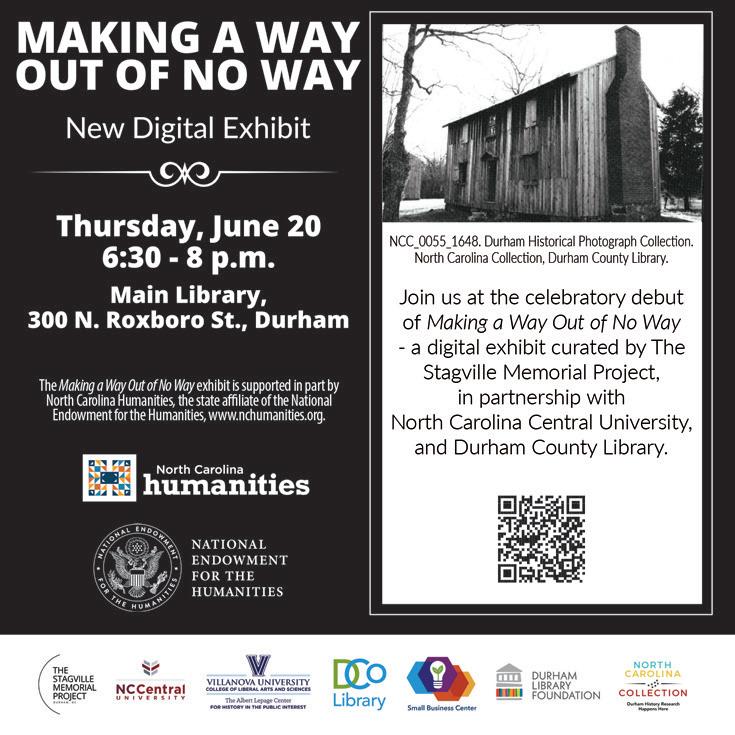
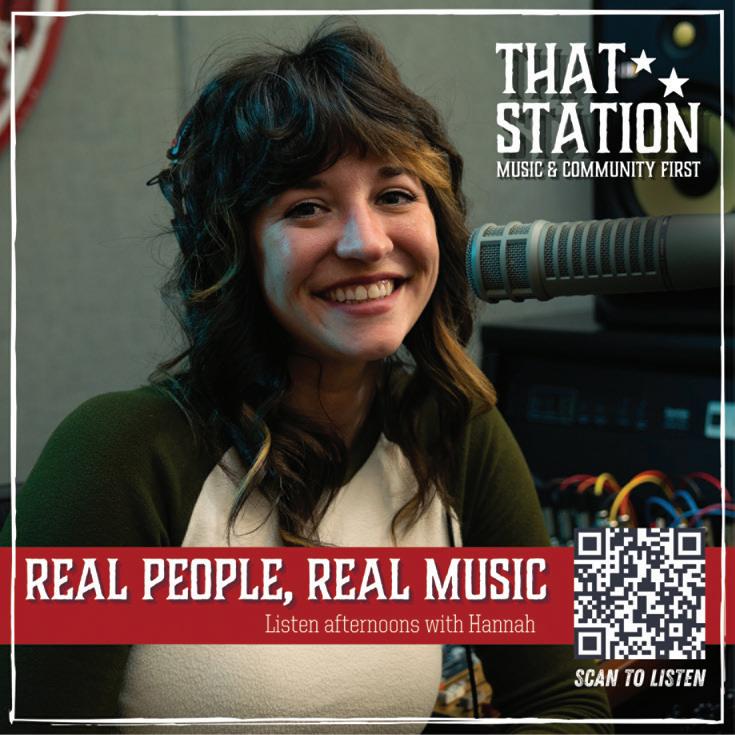

There are dozens of ways to celebrate Juneteenth around the Triangle this year. For registration, ticket information, and more, check out this story on indyweek.com.
BY MILA MASCENIK backtalk@indyweek.com
Juneteenth Jubilee, Raleigh, June 10—19
The City of Raleigh presents this 10-day celebration at John Chavis Memorial Park, featuring free events commemorating African American culture through history, entertainment, and more. Monday kicks off the jubilee’s “Fun Fitness in the Park” program fitness sessions.
Storytime at Oak View, Raleigh, June 13, 11 a.m.—Noon
Wake County Parks, Recreation and Open Space will host a reading of Alice Faye’s children’s book Opal Lee and What It Means to Be Free: The True Story of the Grandmother of Juneteenth at the Historic Oak View County Park. Tour the 1870s tenant house and create your own Juneteenth flag craft.
Lecture on Peter Oliver, Raleigh, June 13, Noon— 1:30 p.m.
Learn about the freedom story of Peter Oliver, a formerly enslaved man from Virginia, and plans for the new public space celebrating his life and legacy at the Archives and History Building Auditorium. George C. Jones, an eighth-generation descendant of Oliver, will speak at the event.
Screening of George H. White Documentary, Raleigh, June 13, 7:30—9 p.m.
Head to the North Carolina Museum of History for a free screening of PBS North Carolina’s documentary on George H. White, one of the most important African American leaders of the Reconstruction era. Following the screening, author Stedman Graham will give a talk on the impact of White’s life, followed by a Q&A session with Graham and other speakers.
2024 Juneteenth Celebration, Hillsborough, June 14, 10 a.m.—9 p.m.
Orange County kicks off its Juneteenth festivities with this event at various locations. This year’s theme aims to explore connections to land, body, and spirit through activities that encourage reflec-
tion, empowerment, and community building.
Juneteenth Joy: A Celebration of Freedom and Gospel Music, Raleigh, June 14, 7:30 p.m.
The North Carolina Museum of Art will celebrate its third annual concert at the Joseph M. Bryan Jr. Amphitheater in the Museum Park with performances by Grammy-winning gospel musician Kirk Franklin and gospel artist Maurette Brown Clark.
Juneteenth Celebration at the Pines, Raleigh, June 14, 8—10 p.m.
Adults ages 18 and older can celebrate Juneteenth at Carolina Pines Park. The event will include musical performances and sing-alongs, as well as an educational piece on the holiday’s history and its current representation in the local community.
Wake Forest’s Juneteenth Celebration, Wake Forest, June 14 and 15
This free two-day event will span multiple locations and feature a community gathering with giveaways, a walking parade, a presentation about renowned sociologist W.E.B. Du Bois, and more.
Juneteenth for the Souls of Black Folks: Meditation and Yoga Session, Durham, June 15, 10—11 a.m.
Unwind and practice wellness at NC Central University School of Law.
Rolesville’s Freedom in the Park Celebration, Wake Forest, June 15, 10 a.m.—2 p.m.
Celebrate Juneteenth at Mill Bridge Nature Park with live performances, family activities, educational information, food, and local vendors.
Juneteenth at Mordecai, Raleigh, June 15, 10 a.m.—4 p.m.
In honor of the holiday, head to Mordecai Historic Park in Raleigh and enjoy historic games and crafts and workshops on oral history and African Ameri-
can genealogy.
Garner’s Freedom Celebration Juneteenth Program, Garner, June 15, 11 a.m.
The Garner Performing Arts Center will house choirs, speakers, educators, and others. This year’s observance centers around the theme of education as freedom.
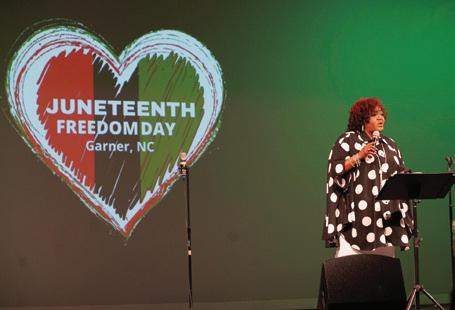
Juneteenth Black Arts Festival, Pittsboro, June 15, 11 a.m.—4 p.m.
The seventh annual event will be held at the Chatham County Fairgrounds with music, performances, visual arts, and more.
Capital City Juneteenth Celebration, Raleigh, June 15, Noon—6 p.m.
Bring your lawn chairs and blankets over to Harvey Hill at Dorothea Dix Park for this free event. The afternoon will include musical performances, food vendors, a children’s activity zone, and other family-friendly activities.
Cary’s Juneteenth Celebration, Cary, June 15, 1—7 p.m.
Historian Darrell Stover organized this free event at Downtown Cary Park with live music, food trucks, and vendors on-site.

North Carolina Juneteenth Celebration, Durham, June 15, 1—8 p.m.
Spectacular Magazine and the Triangle Cultural Awareness Foundation present this annual event at NCCU with live music, a fashion show, vendors, and more.
Bragtown Juneteenth Celebration, Durham, June 15, 2—6 p.m.
Bragtown Community Association presents this event with Merrick-Moore Community Development Corporation at Lakeview Park with African drumming, food trucks, a history panel, and more.
The Joy of House Music and Screening of The Color Purple, Raleigh, June 15, 5—8 p.m.
The North Carolina Museum of Art will host an evening of live house music followed by a screening of The Color Purple (2023) at the Joseph M. Bryan Jr. Theater in Museum Park.

Chapel Hill–Carrboro’s Juneteenth Celebration, Chapel Hill, June 16, 2 p.m.
This free event takes place at the Hargraves Community Center and includes several activities celebrating Black community and culture, such as a Transcribe-A-Thon, where you can transcribe hundreds of recorded interviews from current and former residents of historically Black neighborhoods in
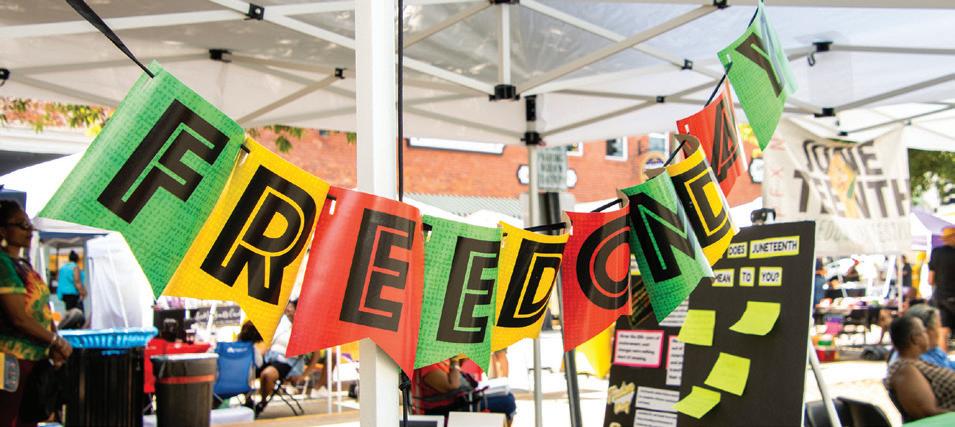
Chapel Hill–Carrboro, a collaborative chalk mural, and a kid’s zone.
Black Vegan Street Market Juneteenth Celebration, Durham, June 16, 3—8 p.m.
Shop for environmentally friendly goods, eat plantbased food, enjoy live performances, and more at Durham Central Park.
Juneteenth at Stagville Open House, Durham, June 17, 10 a.m.—2 p.m.
Visit Historic Stagville, a state historic site and home to one of North Carolina’s largest plantations, and learn local history about slavery and freedom. You can view original slave quarters at Horton Grove in remembrance of those who were enslaved.
Tricksters, Triumphs and Traditions: Stories for Juneteenth, Pittsboro, June 17, 2—4 p.m.
Donna Washington, a Durham-based author and performer, will bring stories from African American and African traditions to life, such as that of the African trickster Anansi, at this family-friendly event at Chatham County Public Library.
Synthesize: A Juneteenth Celebration of Creativity, Technology, and Community, Durham, June 18, 5:30—8 p.m.
Artistry, technology, and Black culture intertwine at this expert-led panel at American Underground. Experience the launch of Synthesize—a new app that can transform local murals into original works of art or poetry—and test it out on American Underground’s rooftop on the colorful mural by Candy Carver. Registration is required.
Seeds of Freedom: Juneteenth at Oak View, Raleigh, June 19, 10:30 a.m.
Participate in a walking tour on the history of Juneteenth and on how Oak View’s enslaved community experienced the transition from slavery to freedom at Historic Oak View County Park. Following the
tour, you can fold your own wildflower seed packet, illustrative of the steps African American families took to plant seeds of freedom. Registration is required, and the event takes place again on June 22 and 23.
Honoring Juneteenth in Our Courts, Durham, June 19, Noon—4:30 p.m.
The North Carolina Association of Public Defenders and the NCCU School of Law’s Social Justice and Racial Equity Institute host this educational event at the NCCU Student Center. There will be a showing of the film Racist Roots: Origins of North Carolina’s Death Penalty and discussions with guest panelists.
Juneteenth Jamboree, Durham, June 19, 7 p.m.
Jam out to performances by three artists of color at Sarah P. Duke Gardens as they sing the music of freedom movements and honor influential Black musicians. Registration required for this free event.
Juneteenth: In Song and Word, Raleigh, June 21, 6:30—9 p.m.
Come Hear NC and the African American Heritage Commission will present this free event at the North Carolina Museum of History. The night will feature music performances by artists such as Grammy-nominated Pierce Freelon and poetry readings by Destiny Hemphill and Fred L. Joiner. Registration required.
Legends Gala, Raleigh, June 22, 7—11 p.m.
Get dressed up and celebrate Juneteenth at Contemporary Art Museum Raleigh with live music, food, and riveting performances.
M.A.N.iFEST Juneteenth Celebration, FuquayVarina, June 23, 2—9 p.m.
Learn about the impact of the performing arts within the African American community and their profound influence in STEM at the Fuquay-Varina Arts Center. W
PHOTO COURTESY OF TOWN OF APEX Still from The Color Purple PHOTO COURTESY OF NCMALOCALS SEAFOOD MARKET
1408 Corporation Parkway, Raleigh | localsseafood.com
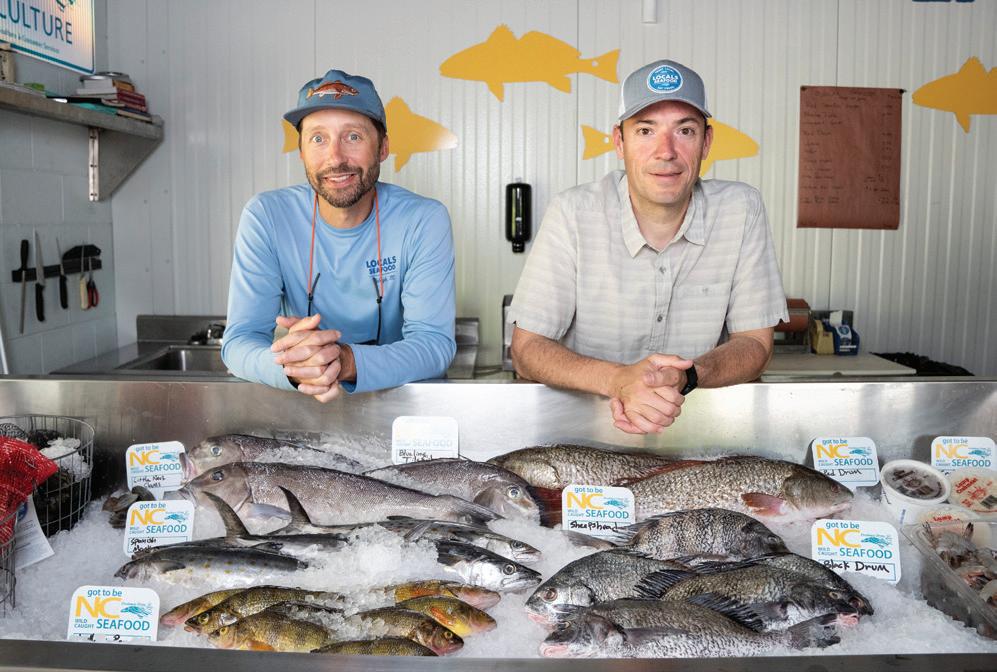
The new Locals Seafood market and processing facility will anchor statewide distribution routes—and help get seafood to more North Carolinians.
BY ANDREA RICHARDS food@indyweek.comLin Peterson, the cofounder of Locals Seafood, starts our tour of the company’s new East Raleigh market and processing facility by pointing out the fishing village Wanchese on a mural of North Carolina. It’s the state’s hub for the commercial fishing industry that sits, somewhat precariously, on the southern end of Roanoke Island. The map isn’t detailed: it’s a large ocean-blue outline of the state that wraps around the corner of the building’s market space, unlabeled except for a small dot representing where we are now.
Still, Peterson is able to demonstrate the morning’s pickups and deliveries on it, tracing the trajectory of the four trucks active today (the company has eight total). One truck is in Wanchese waiting on fish that may or may not be coming in from fisherfolk who navigate the dangerous Oregon Inlet to get it from the Gulf Stream to the shore. Another truck is picking up mariculture-grown
oysters, moving between the 12 family farms that Locals works with. A third truck is on its way toward Asheville, and a fourth is taking Sheepshead from Raleigh to Olivero, a Wilmington restaurant.
Yes, taking Sheepshead back to the coast. As it turns out, thanks to the complications of geography and distribution, there’s no other way to get it there
While Peterson is mapping these trajectories, Ryan Speckman, the business’s other cofounder works his phone nearby, finding out what fish came in and from where, buying from his network of fish houses, and moving the trucks around accordingly. It’s all happening in real time.
“A normal seafood operation would just be Ryan on the market buying the fish people want—getting tuna 52 weeks of the year from somewhere in the world,” says Peterson. “The way we do it, Ryan’s more like a reporter of what’s happening on the coast, like a weather forecaster.”
This syncopated dance of boats, cell phone texts, and refrigerated trucks is what it takes to be one of the only seafood purveyors 100 percent focused on North Carolina product.
“It’s been our niche since we started,” Speckman says. I don’t know if it was intentional, design-wise, but the way that the map wraps around the room in this new market visualizes the problem Peterson and Speckman sought to alleviate when they started Locals Seafood 14 years ago: the coast on one wall, the Piedmont region and western North Carolina on the other.
The work of Locals is in bringing the two back together. That’s what these complicated routes do, six days a week—reconnect the coast’s bountiful harvest to its inland inhabitants.
For the uninitiated, prepare for a series of small shocks regarding the state of seafood: supply chain distribution is all over the map, quite literally. According to a recent New York Times article, 65 to 80 percent of seafood in the United States is imported, with exports netting around $5 billion a year.
The industry is likewise decentralized in North Carolina. Most of the seafood caught off the Tar Heel State’s coast is sent north, following already well-established distribution routes. That means the seafood you scarf down at the beach likely isn’t from there, and the best place to find North Carolina blue crab might be Maryland.
The realization that few folks in the state had access to North Carolina seafood is what inspired Speckman and Peterson to start Locals Seafood in 2010. The two met at NC State University studying fisheries and wildlife science. Over the past decade, they grew the business slowly, expanding from farmer’s markets to wholesale distribution services for grocery stores and restaurants. Along the way, they created seafood subscription services in Raleigh, Durham, and Asheville and opened two retail markets and restaurants—one in Raleigh’s Transfer Co. Food Hall (shuttered in 2022) and another in the Durham Food Hall.
Now, the new public-facing market in East Raleigh, which offers a stunning array of fresh and frozen seafood, as well as specialty items like dry-aged bluefin tuna belly and cured mullet roe, has a relatively small footprint in the renovated 10,000-square-foot building. Most of the building serves as the company’s whole-fish butchery and seafood processing house. There’s room for a potential restaurant too, but right now Peterson and Speckman are focused on processing and distribution.
The new facility triples Locals’ capacity to process North Carolina seafood and consolidates its operations close to I-40.
Location matters: Once you cut fish, the clock begins ticking. Processing near customers helps. An inland fish house like this market ensures that Locals can process and distribute seafood to more distant parts of the states, like Asheville, and still ensure the quality.
Biologists and wildlife conservationists emphasize the importance of connectivity—corridors that species can move safely through so they don’t get stuck in the sort of isolation that leads to extinction. Locals gives North Carolina seafood a safe passage from its home on the coast to inland parts of the state—even though that path may at times look convoluted, like taking Sheepshead fish from the coast to Raleigh and then back again. Centralizing the operations in one place allows suppliers to connect to purveyors and customers across the state.
“We saw the writing on the wall years ago that to really do this correctly, we needed the proper facility,” Speckman says as we walk through the massive space. “And the proper facility is pretty much this.”
“I’ve always been a big proponent of this idea that if we live by a body of water—which we do—that has a beautiful, bountiful amount of local species, we should be eating them.”
If seafood had a relationship status, it would definitely be “it’s complicated.”
There are a number of nonprofit watchguard organizations that monitor sustainability nationally, and as far as the state’s supply goes, many regulations prevent overfishing.
“Our commercial fishermen are great environmentalists—they want to see the continuation of the species,”
John Aydlett, a seafood marketing specialist with the NC Department of Agriculture and Consumer Services, tells the INDY. In 2021, North Carolina’s wild-caught seafood industry contributed almost $300 million in value to the
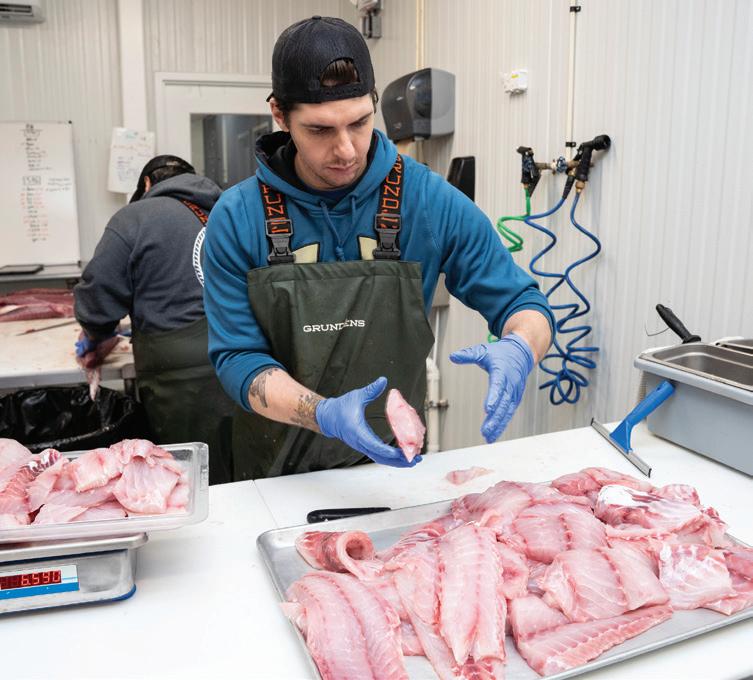
state’s economy and provided some 5,500 jobs. The state’s growing aquaculture industry brings in an annual revenue of $60 million.
As a consumer, it can be hard to keep up with what best practices are: Wild caught? Farmed? Fresh? Frozen?
“We always tell people that if you can’t find local seafood, the best rule of thumb is to buy domestic,” says Speckman, who has concerns about both the quality of overseas products and their social and environmental impacts.
Of course, thanks to this new market—and Locals Seafood’s presence at area farmer’s markets, in stores (Durham Co-Op and Weaver Street Market), and as suppliers to restaurants—it isn’t as hard as it once was to get local seafood.
Just ask Andrea Reusing. The award-winning chef/owner of Chapel Hill’s Lantern Restaurant loves to tell folks how, when she first moved to North Carolina in 1999 and worked at Vin in Raleigh, she’d drive her station wagon to Tom Robinson’s in Carrboro twice a week to get a haul of local seafood.
“There was no east–west distribution of North Carolina fish,” Reusing says. “When I got NC fish from a purveyor, it would have gone up to the Fulton Fish Market in New York City, and then maybe gone down to Atlanta or through Charlotte before coming back. Before Lin and Ryan started Locals there was no other way to get local seafood—except for driving to the coast or maybe getting some through FedEx.”
Right now Reusing features several items procured through Locals on the Lantern menu.
“We have three different kinds of oysters from three

different family cultivators,” she says. “We have wild head-on shrimp and Sheepshead, which is one of my favorite fish—it feeds on crustaceans, so it’s very rich and nutty.”
Not only has Locals helped solve a critical supply chain problem for inland restaurants and consumers, but it’s also helping to expand an appetite for seafood beyond the familiar standards of shrimp, salmon, and tuna. If you care about seafood sustainability, the best step is to eat a more diverse range of fish.
When asked about his relationship with Locals Seafood, Ricky Moore, the James Beard Award–winning chef of Saltbox Seafood Joint, responds by emailing over a photo from 2013.
It shows him in his trademark floppy fisherman’s hat outside the kitchen entrance at Saltbox’s original location, signing a receipt with a Locals delivery person. There’s a refrigerated box and cooler at Moore’s feet, and the men are framed by the two company’s vans parked side by side. For Moore, the photo speaks to the nature of a more than a decade-long partnership between a restaurant and a vital supplier.
“We’ve got history together,” he says, explaining that from the very beginning his concept for Saltbox—preparing the kind of local, seasonal seafood caught by North Carolina fisherfolk that Moore grew up eating in eastern North Carolina—necessitated a supplier with a similar vision. “Not too many people were doing it the way I needed it to be done to bring my restaurant concept to life.”
When Moore first opened Saltbox, he installed a “Trust Me” board alongside his regular menu of seasonal items to help introduce patrons to less familiar fish species.
“In the beginning when Lin and Ryan would bring me stuff like Sheepshead, people would be like, ‘What is a Sheepshead?’ Only folks who grew up eating stuff would know about it,” says Moore. He was happy to find a source that could supply an array of seasonal, local fish, and thus a symbiotic relationship between supplier and chef began: “I’d say, ‘Bring it to me, man, I’ll sell it.’”
“What’s being served in most places are things that people are culturally conditioned to eat. Everybody knows what salmon is, it’s been marketed to us as healthy. Omega-3s, yada yada,” Moore says. “I like to speak about whole fish: growing up in eastern North Carolina, we ate a whole lot of whole fish, smaller fish like croaker and spot. Unless you’re regionally connected to it as a part of your heritage, you would never see those fish on the menu. And why not? We should be eating them!”
Moore doesn’t need his “Trust Me” direc-

tives anymore, and that’s not just due to the slew of awards he’s won: “I got my soldiers out there preaching the gospel—my customers are telling folks, ‘Yeah, go to Saltbox and try this!’” says Moore.
It’s always been about more than just logistics—there’s an educational component to learning about local seafood that the lack of crucial infrastructure has only made more pressing. In the case of North Carolina seafood, most of us didn’t even know all that we were missing out on.
When I was growing up in the late 1980s and early ’90s in Apex, we got our shrimp from a man across the street from Holt & Sons Auto Repair who sold them, fresh from the coast, out of a cooler; in the fall and winter, the same spot was occupied by a different man selling chowchow from his pickup. If a special occasion merited shrimp, my mom knew where to go, just as she knew which farm stand to go to in the summer for fresh corn or squash.
The popularity and proliferation of farmers markets helps, but finding these spots can be a long, often communal process: it’s tips from old-timers, trips to local markets and restaurants, and drives spent scanning the streets, circling back to check out a hand-written sign or curious-looking Quonset hut.
Such stomach-led learning takes time— it’s something that gets shared through interpersonal connections, like generous
friends or skilled guides like Moore, who brings it to the table with enthusiasm, knowledge, and trust. There’s a reason we don’t tell people we don’t like where our favorite restaurants are—not only do we not want to run into them, but we don’t want to mar the experience of something special with someone who isn’t.
Locals Seafood’s expansion will allow outstanding chefs like Moore and Reusing to get the raw materials they need to fuel their creative visions, explore culinary traditions, and preserve cultural heritage.
It will also help ordinary folks like me learn to cook a fish I’ve never seen before, even though it may have swum past me in a nearby body of water. A patient fishmonger at Locals’ counter can explain what it is and detail how to prepare it. Or maybe I’ll learn to shuck an oyster or clean a soft-shell crab in one of the market’s demo classes. Whatever the case, the story of the species will start to be told, just in finding out where it’s from and how to eat it.
“What we really care about is our roots of just getting fish from point A to point B,” Peterson says. “When you come to us to buy your seafood, you’re seeing what’s actually happening on our coast. We won’t have mahi but a couple weeks a year, because that’s when they’re catching mahi off the coast.”
“But we have lots of other fish,” he continues, “and we can tell those stories—introduce people to something like amberjack
or tilefish, black drum, red drum—all these species off our coast that come and go in season. That’s what we’ve been doing for over 14 years at farmers markets—telling that story and letting folks know, ‘Hey, this is something good to try off our coast and it’s a great resource.’”
The expansion also allows the business to tell these fish and shellfish stories to more people in farther reaches of the state, making North Carolina seafood more accessible.
Such infrastructure only becomes more important as the word travels regarding the value of what chefs like Moore and Reusing have long held as a cherished resource. In other words, once you learn the story of a fish—a Sheepshead, say—and get a taste for it, you might be willing to pay more for it next time.
“It’s kind of ironic that in making underutilized fish more expensive, it might actually protect the fisheries in the future,” Reusing says. “When the community starts to see ‘Oh, there’s value in this,’ it becomes something that is worth taking care of.”
“I’ve always been a big proponent of this idea that if we live by a body of water— which we do—that has a beautiful, bountiful amount of local species, we should be eating them,” Moore says. “Locals was—and still is—a wonderful partner in making sure we push this idea of ‘North Carolina first’ in terms of seafood and co-brand North Carolina as not just barbecue but for seafood.” W






Three Raleigh breweries within a half-mile radius shut down early this year. A widening gap between hyperlocal pubs and big-box operations may be to blame.
BY SAM OVERTON food@indyweek.comIn a span of about two months in early 2024, three Raleigh breweries within a half-mile radius closed their doors for good. Little City Brewing and Provisions was the first to go in mid-February; New Anthem Beer Project announced sudden statewide closures throughout March; and on April 6, Clouds Brewing left its West Street storefront.
“Certain businesses were positioned in the right place at the right time,” Little City owner Jon Seelbinder says. “Others didn’t have the exact mechanics of location and brand recognition.”
It isn’t just dumb luck that has allowed some brewpubs to survive—and thrive—over others. According to census data, Raleigh’s population increased by 1.9 percent between 2022 and 2023, making it one of the fastest-growing cities in the nation. The city’s downtown often sees new construction, whether the new high-rise
and accompanying café off Hillsborough Street or the West Street Extension Project.
Operating a local watering hole for the city’s influx of new residents seems like a no-brainer. Unfortunately, the food and drink industry is never quite that simple.
Little City and Clouds Brewing, which operated two blocks from each other, can trace the beginning of their troubles to a March 2017 fire that destroyed a nearby apartment complex and damaged several other buildings.
“There was always supposed to be a phase 2 of Little City,” Seelbinder says. “There was always a kitchen mapped out, but it never got completed. When the fire hit, I said, ‘What the hell do we do now? If we build this kitchen, are we going to make it through this?’”
When it opened in late 2016, Little City operated solely as a brewpub, doling out local beers and some small provisions. Seelbinder says that his intention had always
been to introduce a kitchen, but the fire slowed foot traffic around Glenwood South considerably and made the whole operation near impossible. Little City continued to keep its doors open through early 2024, but the road was often bumpy.
Clouds, on the other hand, has a larger-scale operation. Its North Raleigh taproom opened in 2015, and a full-scale brewpub with German food offerings opened in Durham’s Brightleaf Square in 2016. The downtown Raleigh location was smaller but nevertheless experienced a steady stream of customers since opening in 2014. The fire made things difficult for primary owner Matt MacNeil’s enterprise, but Clouds managed to stay open with help from its two other locations. By 2019, downtown stabilized and Glenwood South was back to normal, the blaze a distant memory.
Then, in March 2020, the country shut down. The food and drink industry was forced to pivot.
“Hosting our own events—drag brunches, trivia—really added to our revenue, showing that people would much rather go out for an experience and pay for that than pay for a meal,” MacNeil says.
Everyone knows that the pandemic hit small businesses hard. But the pain points persisted long after the World Health Organization declared it over in May 2023: rising loan rates, inflation, elevated expectations for an outof-home dining experience, and landlords have impacted Raleigh’s brewpubs.
MacNeil sees a wider trend in breweries at large: small-
er operations, like Flour & Barrel, are more likely to thrive in a hyperlocal community, boosted by word of mouth for residents living within walking distance. Bigger brewing operations—think Highland Brewing Company or Red Oak Brewery, two North Carolina–based craft brewers—also fare better, since they sell their products across the state and bleed into neighboring states. Clouds straddles an awkward middle ground—too large for a hyperlocal community but too small for statewide recognition.
“You’ll see the small brewpubs … something where they’re brewing beer just for themselves,” MacNeil says. “That makes sense. But companies like ours—they’ll only do well if they grow. That’s what we’re working on right now. How do we become a regional brewery? We need to be able to distribute in Charlotte and Wilmington, but also into Tennessee, South Carolina, and Virginia. If we can’t make it there within two to three years, then it’s just not a viable operation.”
It’s difficult to grow when commercial rent prices shoot up and force small businesses out of storefronts they’ve occupied for years. According to MacNeil, Clouds’ move out of its West Street location came as a result of the discrepancies in rent between new builds and older properties— even if they’re only a few blocks away from one another. A newly constructed unit in Smoky Hollow might cost thousands of dollars less than a site on Hillsborough
Street that’s sat vacant for years.
Flour & Barrel, “a catalyst for community, relaxation, and escape,” now sits where Little City operated for eight years. Seelbinder partnered with local restaurateur Anthony Rapillo to open the spot, which features Italian small plates and craft cocktails. Speaking positively about Raleigh at large, Seelbinder stresses that he put a lot of faith into Rapillo, Flour & Barrel, and the community.
“I believe wholeheartedly that when you have something designed a certain way, you have to see it through to make sure it does what it needs to do,” Seelbinder says. “It made sense for me to take a step back, partner with somebody, then make a move. I’m still involved, but the brand really took a beating and I needed a concept change. That’s what we’ve done.”
In Clouds’ former location on West Street, La Mala—a Durham cocktail bar serving up Mexican specials—has already staked its claim, with a large “coming soon” sign below where Clouds’ brick-mounted logo used to be. MacNeil is looking into opening up another location in Raleigh, but the taproom isn’t going anywhere. Neither, they say, is Raleigh’s craft brewery scene.
“We’re doubling down on Raleigh. We’re gonna make it happen,” Seelbinder says.
“But we’re going up against challenges that we wouldn’t have imagined we would face. It’s gonna take all of us leading it together and grabbing hands to really see success from the community as a whole.” W



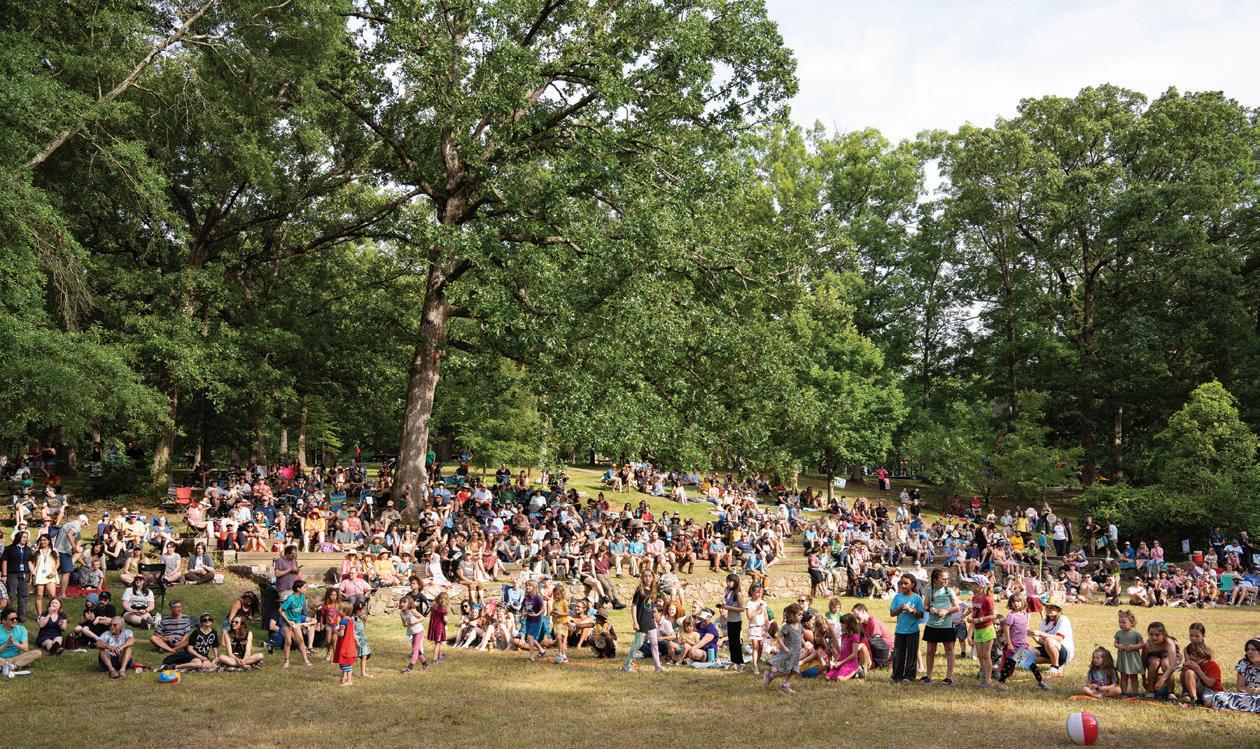
The 20th annual event at Duke Park raised upwards of $27,000 for the Ellerbe Creek Watershed Association.
PHOTOS AND TEXT BY ANGELICA EDWARDS photographer@indyweek.com
Hundreds of visitors sporting tropical attire, beaver tails, and oversized front teeth attended Beavwatch, this year’s theme for the 20th annual Beaver Queen Pageant at Duke Park on Saturday, June 1, 2024.
Contestants Norma Pat, Chic Ada, Clint Eatswood, Kenny Logends, and Woody Wonka performed captivating routines, hoping to win the favor of judges Captain Firecrotch, Cherry Melons, Chewlius Caesar, Captain Beavheart, and Kaferine de Nerve. Woody Wonka, portrayed by Sam Dalzell, 34, of Durham, took the crown this year after performing a routine filled with Oompa-Loompas, candy, and dancing.
The beloved local event began in the early 2000s when concerned residents of Duke Park lobbied the county to save a beaver den being threatened as the state planned to widen I-85. When efforts succeeded, residents threw a pageant the next year to celebrate.
This year, the event raised upward of $27,000 for the Ellerbe Creek Watershed Association, the organization says.
– Angelica Edwards INDY Photographer




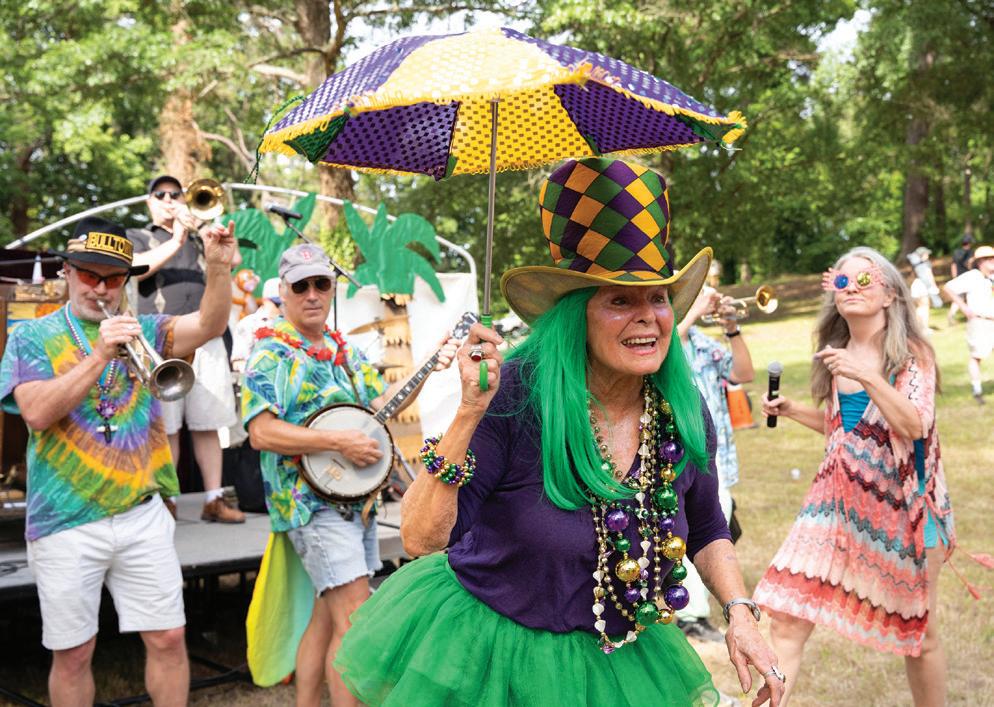

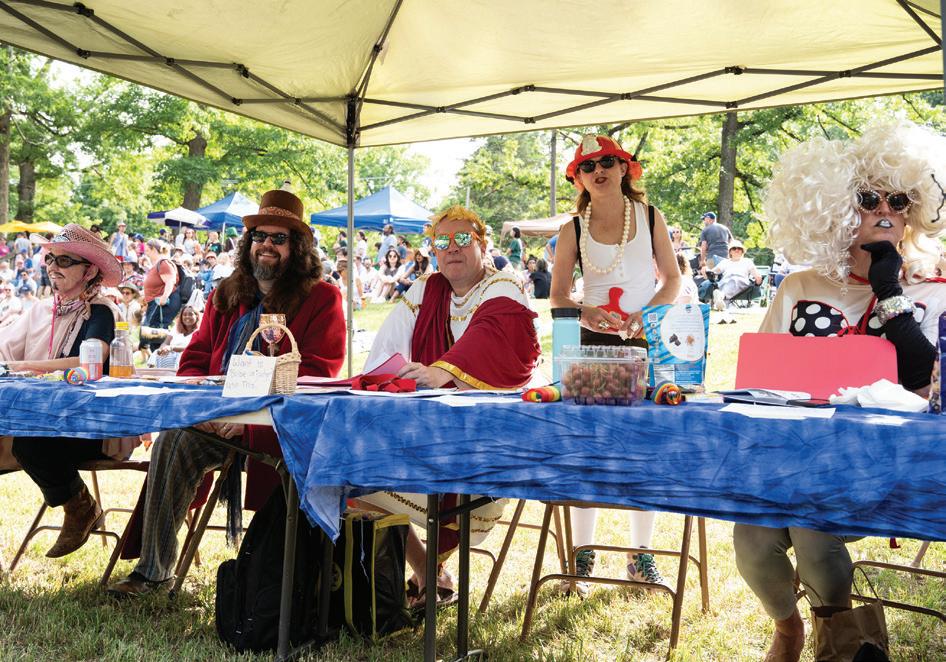


“George H. White: Searching for Freedom” Screening
Thurs, Jun. 13, 7:30 p.m. North Carolina Museum of History, Raleigh.
19th Annual NC Juneteenth Celebration
Sat, Jun. 15, 1 p.m. NCCU Latham Lot, Durham.
Apex Juneteenth Festival
Sat, Jun. 15, 11 a.m. The Depot, Apex.
Capital City Juneteenth Celebration Sat, Jun. 15, 12 p.m. Dorothea Dix Park, Raleigh.
Cary Juneteenth Celebration Sat, Jun. 15, 1 p.m. Downtown Cary Park, Cary.
Juneteenth Joy: Celebrating Black Women, Resilience, and Sisterhood with House Music and “The Color Purple” Screening
Sat, Jun. 15, 5 p.m. NCMA, Raleigh.
Chapel Hill–Carrboro Juneteenth Celebration
Sun, Jun. 16, 2 p.m. Hargraves Community Center, Chapel Hill.
Honoring Juneteenth in Our Courts / “Racist Roots: Origins of North Carolina’s Death Penalty” Screening Wed, Jun. 19, 12:30 p.m. NCCU Student Center, Durham.
Juneteenth Jamboree with Sam Rise, Kyshona, and Grace Givertz
Wed, Jun. 19, 7 p.m. Sarah P. Duke Gardens, Durham.
Juneteenth: “In Song & Word” with Nnenna Freelon, Pierce Freelon, Shana Tucker, Freddy Greene, and the Martin Luther King Jr. All-Children’s Choir
Fri, Jun. 21, 6:30 p.m. North Carolina Museum of History, Raleigh.

WED 6/12
THURS 6/13
Ally J on the Roof 7:30 p.m. The Durham Hotel, Durham.
Chappell Roan: 2024 Midwest Princess Tour
8 p.m. Red Hat Amphitheater, Raleigh.
Justin Timberlake: Forget Tomorrow World Tour
7:30 p.m. PNC Arena, Raleigh.
Liam Purcell & Cane Mill Road 8 p.m. Cat’s Cradle Back Room, Carrboro.
POLLUTE 8 p.m. Rubies on Five Points, Durham.
Savage Knights Vagrancy #2: Spookstina, Emma Dunlap-Grube 8 p.m. Shadowbox Studio, Durham.
The Stomp: Lively Music from Brian Farrow, Dusky Waters, Sinclair Palmer, and Brevan Hampden 7 p.m. Sarah P. Duke Gardens, Durham.
Wednesday Sessions: Live Music, Local Talent Wednesdays at 7 p.m. Speakeasy, Carrboro.
Redwood Jun. 6-23, various times. Mettlesome Theater, Durham.
Wait ’Til You See This! Second Stage Series Jun. 6-22, various times. Burning Coal Theatre Company, Raleigh.
Flashback Flicks Outdoor Movie Series: The Philadelphia Story 8 p.m. Washington Duke Inn & Golf Club, Durham.
Kathy Izard—Trust the Whisper 7 p.m. Quail Ridge Books, Raleigh.
Storytime on the Roof with Durham County Library 10:30 a.m. The Durham Hotel, Durham.
Artist Notes 7 p.m. The Corner, NC State Centennial Campus, Raleigh.
Carolyn Wonderland 7:30 p.m. The Blue Note Grill, Durham.
Drive-By Truckers: The Southern Rock Opera Revisited 8 p.m. The Ritz, Raleigh.
Old Gods of Appalachia: Unhallowed Grounds
8 p.m. The Carolina Theatre, Durham.
PineCone Bluegrass Jam 7 p.m. Riparian Provision Company, Raleigh.



Twen 8 p.m. Rubies on Five Points, Durham.
The Yardarm Album Release Show 8 p.m. Cat’s Cradle Back Room, Carrboro.
ADF: Ballet Hispánico Jun. 13-16, various times. Page Auditorium, Durham.
The Cookout, a Comedy Show Jun. 13-15, 8 p.m. TR Studios, Raleigh.
SCREEN
Movie Loft presents Dream a Little Dream 8 p.m. Shadowbox Studio, Durham.
Melissa B. Jacoby—Unjust Debts: How Our Bankruptcy System Makes America
More Unequal Jun. 13, 7 p.m. Quail Ridge Books, Raleigh. Jun. 18, 5:30 p.m. Flyleaf Books, Chapel Hill.
William Sturkey—The Ballad of Roy Benavidez 5:30 p.m. Flyleaf Books, Chapel Hill.
FRI 6/14
SAT 6/15
ADF’s Latin Dance Party 9 p.m. The Fruit, Durham.
The BMGM Quartet 7:30 p.m. Sharp 9 Gallery, Durham.
Dave Matthews Band: 2024 Summer Tour 7:30 p.m. Coastal Credit Union Music Park, Raleigh.
Dwight Yoakam / The Mavericks 7 p.m. Red Hat Amphitheater, Raleigh.
Freight Train Blues: Blue Ridge Opry 6:30 p.m. Carrboro Town Commons, Carrboro.
Legacy of Jazz: A Tribute to Chick Corea and Gary Burton 8 p.m. The Cary Theater, Cary.
North Carolina Symphony 8 p.m. Southern Village, Chapel Hill.
Sean Mason 6:30 and 9 p.m. Missy Lane’s Assembly Room, Durham.
Sean Paul: Greatest Tour 2024 7 p.m. The Ritz, Raleigh.
Setting 8 p.m. Cat’s Cradle Back Room, Carrboro.
UNCUT JAMS 10 p.m. Rubies on Five Points, Durham.
ADF: Hung Dance Jun. 14-15, 7 p.m. Reynolds Industries Theater, Durham.
The ComedyWorx Show Fridays at 8 p.m. ComedyWorx, Raleigh.
The Ghost of Splinter Cove Jun. 14-23, various times. Titmus Theatre, Raleigh.
The Harry Show Fridays at 10 p.m. ComedyWorx, Raleigh.
WUNC’s Due South Live! 7:30 p.m. Motorco Music Hall, Durham.
Bird and Byron 8 p.m. Cat’s Cradle Back Room, Carrboro.
Crones of Anarchy 7 p.m. Succotash, Durham.
Girls Night Out Tour: Kierra Sheard, Naomi Raine, Koryn Hawthorne, and Wande 7 p.m. Martin Marietta Center for the Performing Arts, Raleigh.
Hardy with Kip Moore, Travis Denning, and Ella Langley: Quit!! Tour 6:45 p.m. Coastal Credit Union Music Park, Raleigh.
Live Music Saturdays 5 p.m. Riparian Provision Company, Durham.
Moroderik & Co. 8 p.m. Motorco Music Hall, Durham.
Nation of Language
8 p.m. Haw River Ballroom, Saxapahaw.
North Carolina Symphony Summerfest: Classical Favorites 8 p.m. Koka Booth Amphitheater, Cary.
Rissi Palmer 7 p.m. The ArtsCenter, Carrboro.
Sample Sale Music: Dasan Ahanu + Tai Allen, The Holloway Group Band 7:30 p.m. The Cary Theater, Cary.
Scott Sawyer Quartet 7:30 p.m. Sharp 9 Gallery, Durham.
Shay De Castro 9 p.m. The Fruit, Durham.
Souly Ghost 6:30 and 9 p.m. Missy Lane’s Assembly Room, Durham.
Three Dog Night 8 p.m. The Carolina Theatre, Durham.
House Party 9 p.m. Mettlesome Theater, Durham.
Marc Maron: All In 8 p.m. The Carolina Theatre, Durham.
Santiago Angel: These Jokes Ruined My Life 8 p.m. Durty Bull Brewing Company, Durham.
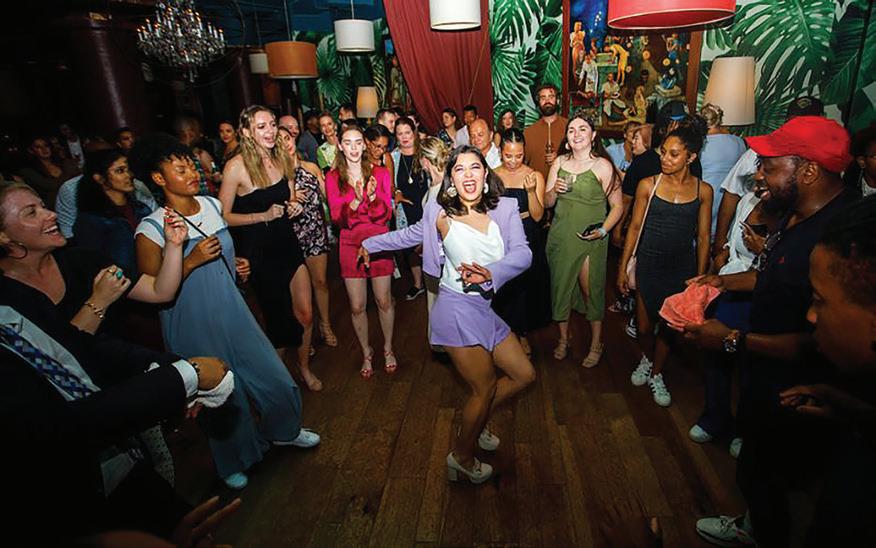
SUN 6/16 MON 6/17
MUSIC
Triangle Blues Society
4 p.m. Speakeasy, Carrboro.
Vocal Arts Ensemble of Durham: “What the Earth Says” 4 p.m. Duke Chapel, Durham.
STAGE
An Evening with Kevin Smith 8 p.m. The Carolina Theatre, Durham.
Wedding Day Worries 3 p.m. The Fruit, Durham.
STAGE
Cosmic Chuckles Stand Up Comedy Night Mondays at 9 p.m. Flying Saucer Draught Emporium, Raleigh.
TUES 6/18
MUSIC
Camera Obscura 8 p.m. Cat’s Cradle, Carrboro.
Dynamic Duos in Durham: Brown Mountain Lightning Bugs 7 p.m. Huron Stage Music Venue, Durham.
Goose: 2024 Summer US Tour 8 p.m. Red Hat Amphitheater, Raleigh.
Jeremy “Bean” Clemons Tuesdays at 8 p.m. Kingfisher, Durham.
Live Acoustic Rock with Brendan Macie and Doug Burton 9 p.m. The Cave, Chapel Hill.
Wilco 7:30 p.m. NCMA, Raleigh.
ADF: Ronald K. Brown/ EVIDENCE Jun. 18-19, 7:30 p.m. Reynolds Industries Theatre, Durham.
Comedy Bang! Bang!: The Bang! Bang! Into Your Mouth Tour 8 p.m. The Carolina Theatre, Durham.
PAGE
Pride Author Panel 7 p.m. Quail Ridge Books, Raleigh.
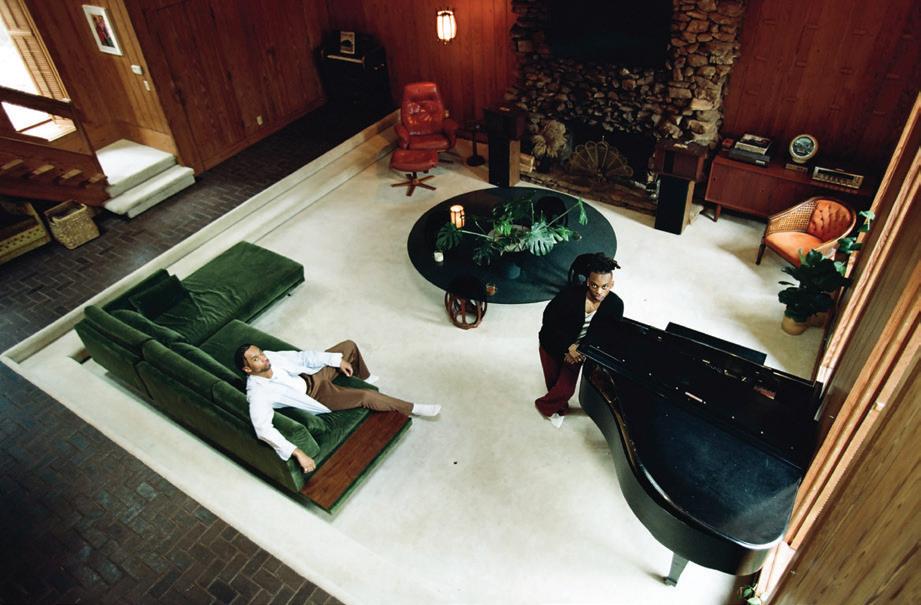
WED 6/19
MUSIC
3rd Wednesday Jazz Jam 5 p.m. Succotash, Durham.
Flwr Chyld and Grimm Lynn 8 p.m. Missy Lane’s Assembly Room, Durham.
Maggie Rogers: Don’t Forget Me Tour 7:30 p.m. Coastal Credit Union Music Park, Raleigh.
Savage Nights Vagrancy #3: Alana Stanley, Logan Maxwell, Chris Eubank, Chris Black 8 p.m. Shadowbox Studio, Durham.
Wednesday Sessions: Live Music, Local Talent Wednesdays at 7 p.m. Speakeasy, Carrboro.
STAGE
Improv Showcase 7:30 p.m. Rubies on Five Points, Durham.
Pod Meets World Live: The Kids Wanna Jump! Tour 7:30 p.m. The Carolina Theatre, Durham.
SCREEN
Flashback Flicks Outdoor Movie Series: Casablanca 8 p.m. JB Duke Hotel, Durham.
PAGE
Serena Kaylor—The Calculation of You and Me 7 p.m. Quail Ridge Books, Raleigh.
MUSIC
Alesana 6:30 p.m. Cat’s Cradle, Carrboro.
Al Strong presents Jazz on the Roof 7 p.m. The Durham Hotel, Durham.
STAGE
ADF: Baye & Asa Jun. 20-22, 7:30 p.m. Rubenstein Arts Center, Durham.
Jeff Ross: Take a Banana for the Ride 8 p.m. The Carolina Theatre, Durham.
PAGE
Paige McClanahan—The New Tourist 5:30 p.m. Flyleaf Books, Chapel Hill.
FRI 6/21 SAT 6/22
BARNABY! / The All Things 8 p.m. Shadowbox Studio, Durham.
Cody Jinks: Change the Game Tour 7 p.m. Red Hat Amphitheater, Raleigh.
The Floor 10 p.m. Rubies on Five Points, Durham.
FlushFest 2024 Jun. 21-22, 11 a.m. Eno River Brewing, Hillsborough.
“FREESHOW” 7 p.m. Transfer Co. Ballroom, Raleigh.
Freight Train Blues: The Sacred Soul of North Carolina Revue 6:30 p.m. Carrboro Town Commons, Carrboro.
Jazmin Ghent Jun. 21-22, various times. Missy Lane’s Assembly Room, Durham.
Kim Gordon: The Collective Tour 8 p.m. Cat’s Cradle, Carrboro.
Live Vinyl Spinning by PhDJ 7 p.m. Beer Study, Durham.
North Carolina Symphony Summerfest: Swan Lake 8 p.m. Koka Booth Amphitheater, Cary.
Ryan Adams 8 p.m. Martin Marietta Center for the Performing Arts, Raleigh.
THRIO 7:30 p.m. Sharp 9 Gallery, Durham.
Yellow Days 9 p.m. Motorco Music Hall, Durham.
The ComedyWorx Show Fridays at 8 p.m. ComedyWorx, Raleigh.
The Harry Show Fridays at 10 p.m. ComedyWorx, Raleigh.
Hush Hush: Comedy Based on Secrets 9 p.m. Mettlesome Theater, Durham.
DATAHATA Record Release Party 8 p.m. Shadowbox Studio, Durham.
Denty Westlake Quartet 7:30 p.m. Sharp 9 Gallery, Durham.
GAG, Queen! A Drag Dance Party Extravaganza 8 p.m. The Ritz, Raleigh.
JMSN 9 p.m. Motorco Music Hall, Durham.
Rose City Band 8 p.m. Cat’s Cradle Back Room, Carrboro.
Seth Rudetsky: Seth’s Big Fat Broadway Show 7:30 p.m. Theatre Raleigh, Raleigh.
The Settlement 9 p.m. Speakeasy, Carrboro.
Tim McGraw and Carly Pearce: Standing Room Only Tour 7 p.m. PNC Arena, Raleigh.
Funny as Puck LolFest Comedy Show 8 p.m. Durty Bull Brewing Company, Durham.
Golden Age: Comedy Based on Special Guests 8:30 p.m. Mettlesome Theater, Durham.
Justin Willman: Magic for Humans in Person Tour 7 p.m. Martin Marietta Center for the Performing Arts, Raleigh.
North Carolina Summerfest: Cirque under the Stars 8 p.m. Koka Booth Amphitheatre, Cary.
The Sensory-Friendly ComedyWorx Show 1 p.m. ComedyWorx, Raleigh.
PAGE
WE WRITE TO MAKE IT BETTER: The Need for Queer and Diverse YA 2 p.m. Chapel Hill Public Library, Chapel Hill.
SUN 6/23
Chantae Cann 6:30 and 9 p.m. Missy Lane’s Assembly Room, Durham.
Elliott Fullam 8 p.m. Cat’s Cradle Back Room, Carrboro.
Outlaw Music Festival: Willie Nelson, Bob Dylan, Robert Plant, and Alison Krauss 5 p.m. Coastal Credit Union Music Park, Raleigh
STAGE
ADF: Doug Varone and Dancers 7:30 p.m. Reynolds Industries Theater, Durham.
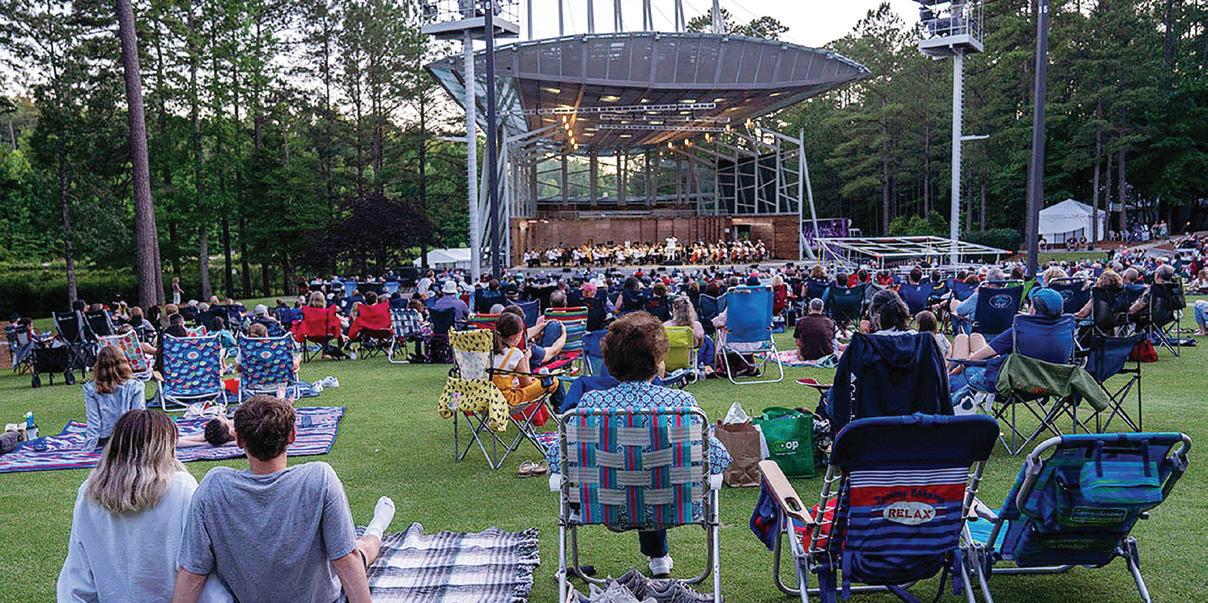
MON 6/24 TUES 6/25
Future Islands: North American Tour 2024 8 p.m. Martin Marietta Center for the Performing Arts, Raleigh.
STAGE
Cosmic Chuckles Stand Up Comedy Night Mondays at 9 p.m. Flying Saucer Draught Emporium, Raleigh.
MUSIC
All Under Heaven 8 p.m. Cat’s Cradle Back Room, Carrboro.
Dynamic Duos in Durham: RAGA BIHAG 7 p.m. NorthStar Church of the Arts, Durham.
Jenny Lewis 8 p.m. Haw River Ballroom, Saxapahaw.
Jeremy “Bean” Clemons Tuesdays at 8 p.m. Kingfisher, Durham.
North Carolina Jazz Repertory Orchestra 7:30 p.m. Sharp 9 Gallery, Durham.
Quasi 8 p.m. Motorco Music Hall, Durham.
ADF: Kayla Farrish Jun. 25-27, 7:30 p.m. Rubenstein Arts Center, Durham.
PAGE
Amanda Bellows—The Explorers: A New History of America in Ten Expeditions 5:30 p.m. Flyleaf Books, Chapel Hill.
John Balaban—Passing Through a Gate 7 p.m. Quail Ridge Books, Raleigh.


The most recognized award throughout the Triangle is back for 2024 — next up:
Vote for your favorite Durham County bar, veterinarian, bookshop, museum—whatever it may be, there are over 100 categories in which you can profess your favorite Durham County treasures. Have no fear: Orange & Chatham Counties will have their own nomination soon.

To download a pdf of this puzzle or view its solution, visit indyweek.com/puzzles-page


© Puzzles by Pappocom
There is really only one rule to Sudoku: Fill in the game board so that the numbers 1 through 9 occur exactly once in each row, column, and 3x3 box. The numbers can appear in any order and diagonals are not considered. Your initial game board will consist of several numbers that are already placed. Those numbers cannot be changed. Your goal is to fill in the empty squares following the simple rule above.
If you’re stumped, find the answer keys for these puzzles and archives of previous puzzles (and their solutions) at indyweek.com/puzzles-page or scan this QR code for a link. Best of luck, and have fun!


Sr. Project Engineer
Baker Concrete Construction, Inc. seeks a Sr. Project Engineer to work in Raleigh, NC and various unanticipated locations throughout the U.S. to support field activities and project administration for the company’s vertical concrete construction projects throughout the U.S. Apply online at www. bakerconstruction.com/careers/. Must put requisition number 4968 on resume.
Sr. Regional Sales Manager
Sr. Regional Sales Manager (SESM-HT). Generate sales leads, which lead to quotations & order intake. Travel 50% domestically & internationally. Telecommuting permitted. Reqs BS+1 yr rltd exp or BS eqiv based on a combo of edu and/or exp as determined by a prof eval service. Mail resumes to Syntegon Technology Services: HR Manager, 2440 Sumner Blvd., Raleigh, NC 27616. Must ref job title & code.

